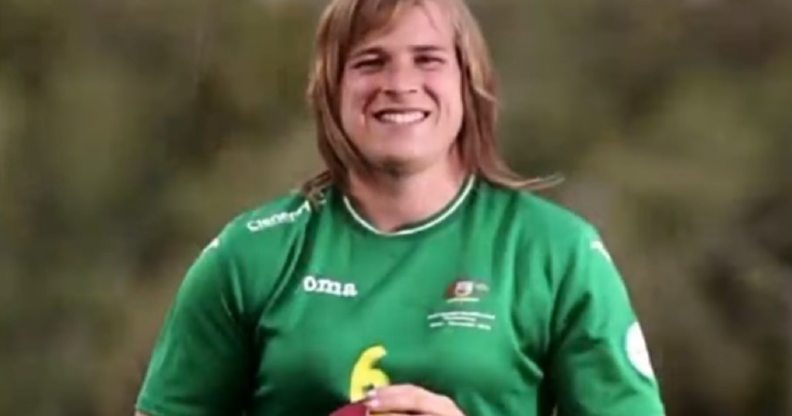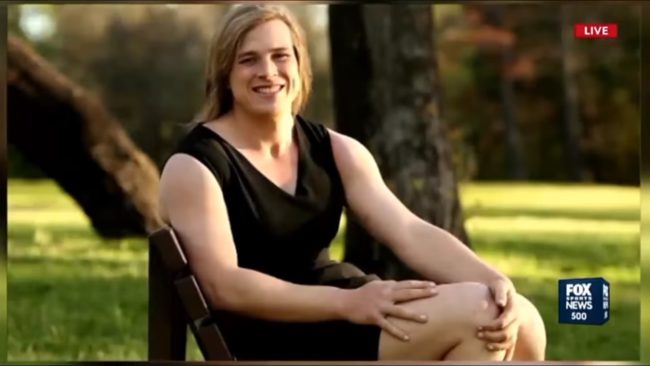Transgender footballer given permission to play in women’s league

A transgender woman has been admitted to a Australian rules women’s football league in Australia for the first time.
Australian player Hannah Mouncey, 28, had sought permission from Aussie rules body the Australian Football League to play in the women’s league at state level.
This week, the AFL told Mouncey that she will be allowed to play in the state of Victoria this season, but will not be allowed to play in the national AFL Women’s league this season.
Before her transition to female, Mouncey had represented Australia on the men’s national handball team, representing the country 22 times.
She came out as trans in 2015.
The decision to allow Mouncey to play was signed off by the AFL’s general counsel Andrew Dillon and inclusion and social policy manager Tanya Hosch.
Hosch said: “We are committed to inclusion, and want all Australians to be able to play or participate in our game. These are complex issues and we are considering expert opinion, international frameworks and feedback from the communities that are impacted by our decisions.”

The AFL added: “Eligibility decisions are generally made by state and local leagues in accordance with the rules and policies of the relevant football body.
“However, the AFL strongly encourages all Australian football competitions to adopt the AFL’s recommendation to facilitate the inclusion of trans players at the community level until the AFL’s gender diversity policy is finalised.”
In a lengthy statement, Hannah Mouncey said: “I welcome the AFL’s decision, and I look forward to hopefully playing this season. And while I wholeheartedly thank those who have supported me through this time, I will not and I think it would be highly inappropriate for me to thank the AFL for allowing me to do something open to every other Australian, which the science and research has supported all along.
“Had we simply gone by the research at the start, we could have avoided the whole saga which has taken place completely. I am however grateful that they took the time to look at this situation properly, as it is complex, and took all the relevant advice on board that was provided. “
She added: “”While being allowed to play is very much a positive, the line of questioning I’ve received and the circus that has ensued around my ability to play for the last four months has certainly highlighted two things. This includes the very much understandable lack of knowledge and understanding around the science involved in gender transition.
“This is I think to be expected and I understand, it is not something that I would expect everyday people to be across.
“But more importantly and worryingly, it showed a disturbing willingness by those who don’t understand it to dismiss research and evidence which has been through the most rigorous scientific checks and balances.
“This seems to be the only area of medicine where people with no background in medicine, science or the relevant issues are more than willing to dismiss the advice of experts simply because it does not necessarily match what they were brought up to believe.
“It’s time we looked at why this is, and why this is one of the very few areas of medicine and science where this is the case.
“People also need to realise that in the big scheme of things, football really doesn’t matter all that much. Yes, this was of course originally about playing, but the lack of communication and common decency in my dealing with the AFL meant it quickly became about far, far more. “
She added: “For me [being trans] has meant huge challenges in finding housing and employment, but more significantly the loss of some people who were very very important to me, including my best friend.
“It must be understood that for people supporting someone who is transitioning, the process can at times be even more difficult. Imagine trying to support someone who is going through the hardest time of there life, while also grieving the person you knew. It would be almost impossible.
“I know for my friend this was understandably the case as she was also dealing with seeing me as unwell as anyone could ever be too, and understandably needed to remove herself from the situation.
“This is why there needs to be far more support for the families and friends of trans people than there currently is, and that starts with acceptance by the general community. The more normalised being trans is in society, the easier it will be for everyone. But that doesn’t mean we don’t need more support services for them and the people transitioning- these are very much overdue.”
She added: “So while yes, it’s good to be able to play and is a great outlet and I love it, I and other trans people have much bigger things to worry about. Which is why even though initially this was about my playing football, as soon as I was denied knowledge of the process involved, communication with those making the decision, or just plain ignored when trying to get the most basic information back in November, it became for me something much bigger.
“It became about making sure that I as a trans person am not treated any differently to anyone else, and neither is any other trans person out there. Yes, the AFL may prefer that I did not exist or chose to go and do something else, but that is not how it is, and we are not people to be ignored in the hope that will happen.
“It also became about making sure that for those who went through so much when I transitioned, that it wasn’t in vain. That I still try and be the best person I can and take every opportunity that comes my way. If anything, it would have been unfair and insulting to them to give up.”

